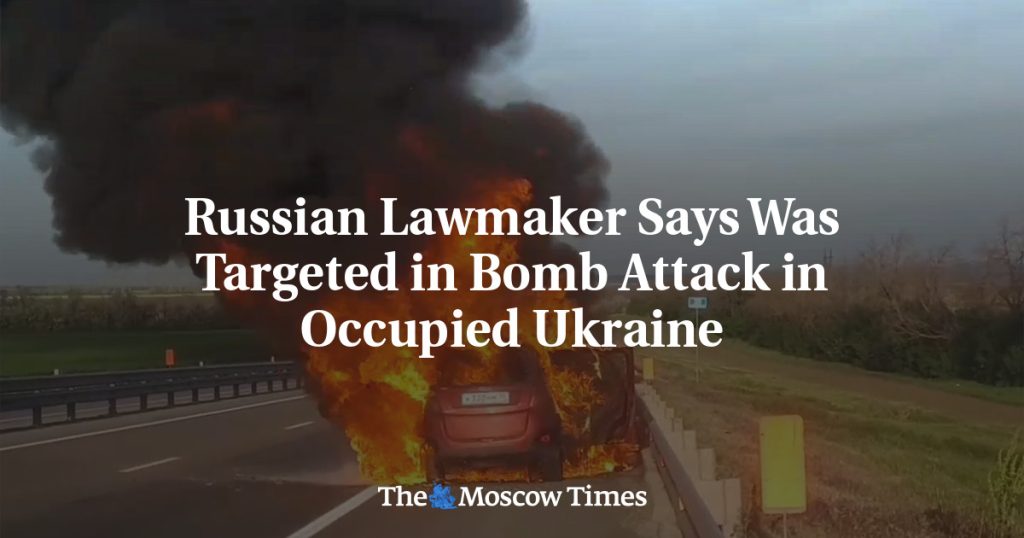Russian lawmaker Denis Kharitonov, a member of the ruling United Russia party, claimed he was targeted in a car bomb attack in occupied Ukraine over the weekend. Kharitonov, who earlier this year announced that he had joined the military and was deployed to the front line, shared a video on Telegram showing his car burning on the side of the road in Ukraine. While he did not specify whether he was in the car at the time of the explosion or where exactly it happened, he mentioned that a “special brigade department” was investigating the incident. Kharitonov commented that it had been a while since he had been involved in such an attack, hinting that he may have been targeted in the past.
Since Russia’s full-scale invasion of Ukraine in February 2022, numerous Russian officials and pro-war figures have been victims of assassination plots, with Moscow frequently blaming Kyiv for these attacks. Kharitonov’s claimed incident adds to the growing list of individuals targeted in acts of violence in connection to the ongoing military conflict. The term “zone of the special military operation,” preferred by the Kremlin to describe the situation in Ukraine, was used by Kharitonov in his statement about the car bombing. The lack of specific details about the attack raises questions about the circumstances surrounding it and the motivations behind it.
The political and military tensions between Russia and Ukraine have continued to escalate since the invasion began, resulting in ongoing violence and conflict in the region. The targeting of Russian officials and individuals connected to the war effort in Ukraine highlights the danger and volatility of the situation, with acts of violence and retaliation becoming more common. Kharitonov’s involvement in both regional politics in Russia and military operations in Ukraine may have made him a target for those seeking to undermine or disrupt Russian activities in the region. The lack of clarity regarding the details of the car bomb attack further complicates understanding the motivations and potential perpetrators behind the incident.
The use of targeted violence, such as car bombings, as a tactic in the conflict between Russia and Ukraine raises concerns about the safety and security of individuals involved in political and military activities in the region. The vulnerability of Russian officials and pro-war figures to acts of violence underscores the high stakes and risks associated with the ongoing conflict. The impact of these incidents on the broader geopolitical landscape in Europe and beyond is significant, as they contribute to an atmosphere of instability and uncertainty in the region. The lack of accountability and transparency in determining responsibility for these attacks further complicates efforts to address the situation and prevent further escalation of violence.
As Russia’s military operations in Ukraine continue to unfold, the threats and risks faced by individuals connected to the conflict are likely to persist and escalate. The use of car bombings and other violent tactics underscores the intensity and brutality of the conflict, with both sides engaging in acts of aggression and retaliation. The targeting of Russian officials like Denis Kharitonov reflects the complex dynamics at play in the conflict, with multiple actors seeking to influence and undermine the opposing side. The challenges of addressing these security threats and maintaining stability in the region remain significant, requiring a coordinated and multilateral approach to de-escalate tensions and prevent further violence.
In conclusion, the car bomb attack on Russian lawmaker Denis Kharitonov in occupied Ukraine underscores the dangers and complexities of the ongoing conflict between Russia and Ukraine. The targeting of individuals involved in politics and military operations highlights the high stakes and risks associated with the conflict, as well as the broader implications for regional and international stability. The use of violence as a tactic in the conflict raises concerns about the safety and security of those involved, as well as the potential for further escalation and retaliation. Addressing these security threats and mitigating the risks associated with the conflict will require a sustained and coordinated effort to de-escalate tensions and promote peace in the region.


